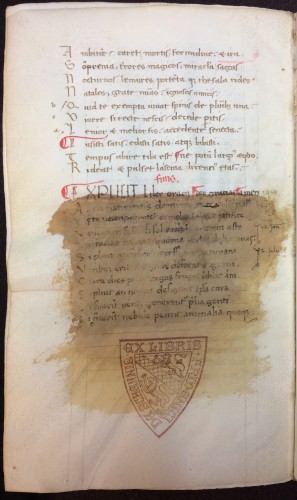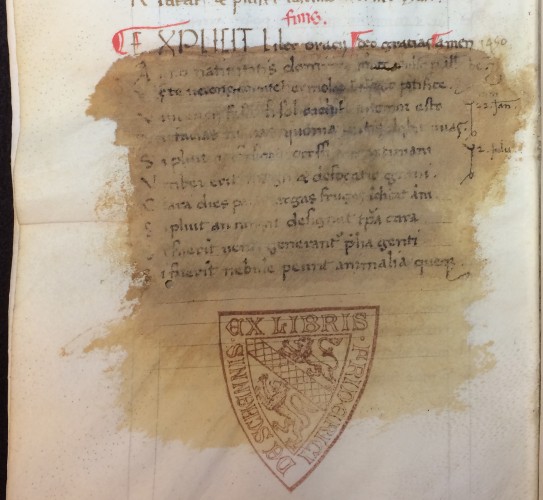When cataloging this fifteenth-century Italian manuscript, I saw that some of the pages have been damaged by brushing a chemical reagent on some passages that were difficult to read. While in the short term this substance was suppossed to make traces of ink more legible, the long-term impact on the manuscript is disastrous as shown in the page displayed below.

Folio 37v from Horace (65-8 BC). Ars Poetica & Epistulae. Parchment. Italy. 15th c. With armorial stamp of Frederic Schennis
On the last page of the manuscript, the damage caused by the reagent affects ten lines that were added after the completion of the main text of the manuscript (Horace's Ars Poetica & Epistulae), probably by the scribe himself. On the margin we can read the dates "1450", "22 Jan", and 2 Julii.

Detail of Folio 37v from Horace (65-8 BC). Ars Poetica & Epistulae. Parchment. Italy. 15th c. With armorial stamp of Frederic Schennis
With some difficulty, these lines can be transcribed as follows:
Anno nativitatis domini m(illessim)o [ccccl?] [ ? ]
Ve(ne)to veronen(si) epi(scopa)nte hermolao a(b) [Nicholao?] po(n)tifice.
Vincenti festo si sol radiet memor esto
(Ut) facias cuvas quoniam vitis dabit uvas
Si pluit in festo processi (et) martiniani
Ymber erit [grandis] et defocatio grani
Clara dies pau(li) largas fruges indicat a(n)ni
Si pluit aut ningit designat t(em)p(or)a cara
Si fuerint venti generatitu(r) p(re)lia genti
Si fueri(n)t nebule pereunt animalia queq(ue).
The reference to Hermolao Barbaro, Bishop of Verona (1453-1471) suggests that this manuscript was copied in that Italian city in the 1450s or later. The rest of the damaged text consists of Latin weather proverbs. Here is an English translation:
If the sun shines on St. Vincent’s day remember
To prepare tuns because the vines will produce grapes.
If it rains on the days of St. Processus and St. Martinianus,
There will be a severe winter and scarcity of grain.
If St. Paul’s day is clear, it indicates a year of abundant harvests.
If it rains or snows, it means hard times.
If it is windy, it will generate wars.
If it is cloudy, animals will perish.